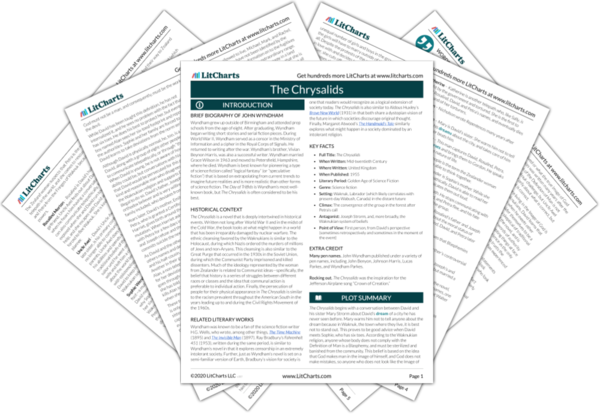The title of Wyndham’s book introduces time as an important theme in the novel because the word “chrysalid” implies a specific sense of time. The word can either mean “a shell that has been discarded” or “a preparatory or transitional state”—it is either something in the past or something preparing for the future. Because Wyndham never uses the word anywhere in the text of the novel, however, it is not clear precisely to what or whom “the chrysalids” refers.
In Waknuk, people believe that time progresses in a linear fashion toward a better and more moral future. The Waknukians’ goal is to rebuild the society that was lost in the Tribulation and live according to God’s Word by ridding society of any mutations. The forward motion of time is very important to the Waknukians, and only those who align with the Definition are allowed to contribute to this progression. Reproduction is encouraged and valued among those who fit the Definition, while those deemed Blasphemies are sterilized before being cast out into the Fringes. The people in the Fringes, on the other hand, as well as those from Zealand, believe in a more cyclical version of time in which history constantly repeats itself. People from both places believe that “life is change,” and they are not nearly as concerned with moving forward down a direct path to perfection.
The Chrysalids calls into question the idea that society can be manipulated into moving in a certain direction. Instead, it suggests, or perhaps even warms, that history repeats itself. Indeed, although the Waknukians conceive of time as moving forward, they want to move forward by replicating the past. The title, then, expresses the repetitive and cyclical nature of time through its two definitions. If David and the others who can think-together are “chrysalids” transitioning into a new society, they are also leaving a chrysalid of their previous society behind. Meanwhile, the supremacist ideas expressed by the Zealanders suggest that even though David and the group are transitioning to a new place and future, this society, too, will turn into an empty shell of the past.
Time and Progress ThemeTracker

Time and Progress Quotes in The Chrysalids
“A word…a rusted mirror, reflecting nothing. It’d do the preachers good to see it for themselves. They’d not understand, but they might begin to think. They might begin to ask themselves…Are we right? For it is clear, boy, that however wonderful the Old People were, they were not too wonderful to make mistakes—and nobody knows, or is ever likely to know, where they were wise and where they were mistaken.”
“God doesn’t have any last word. If He did, He’d be dead. But He isn’t dead; and He changes and grows, like everything else that’s alive. So when they were doing their best to get everything fixed and tidy on some kind of eternal lines they’d thought up for themselves, He sent along Tribulation to bust it up and remind ‘em that life is change.”
“Your work is to survive. Neither his kind, nor his kind of thinking will survive long. They are the crown of creation, they are ambition fulfilled—they have nowhere more to go. But life is change, that is how it differs from the rocks, change is its very nature. Who, then, were the recent lords of creation, that they should expect to remain unchanged?”
“The Old People brought down Tribulation, and were broken into fragments by it. Your father and his kind are a part of those fragments. They have become history without being aware of it. They are determined still that there is a final form to defend: soon they will attain the stability they strive for, in the only form it is granted—a place among the fossils.”
“Sometime there will come a day when we ourselves shall have to give place to a new thing. Very certainly we shall struggle against the inevitable just as these remnants of the Old People do. We shall try with all our strength to grind it back into the earth from which it is emerging, for treachery to one’s own species must always seem a crime. We shall force it to prove itself, and when it does, we shall go; as, by the same process, these are going.”
“The essential quality of life is living; the essential quality of living is change; change is evolution: and we are part of it.”











